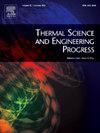基于自适应 PID 控制器的燃料电池无刷直流驱动器直接扭矩控制,用于工业驱动应用
IF 5.1
3区 工程技术
Q2 ENERGY & FUELS
引用次数: 0
摘要
燃料电池驱动的无刷直流电机(BLDC)由于效率高、结构简单、体积小而被广泛应用于电气领域。使用简单的传统 PID 控制器,要调整设置并以满功率产生亮点是一项挑战。为了有效调节 BLDC 驱动器的扭矩和速度,本文提出了基于自适应 PID(APID)控制器的直接扭矩控制(DTC)。为了理解无刷直流电机驱动框架中出现的非线性、参数波动和负载转运困难,保持良好的转矩控制性能,DTC 被用作工业驱动系统中一种合适的控制技术。对比测试是电机驱动器参考速度和转矩的阶跃变化。使用 MATLAB/Simulink 进行模拟,并利用实验结果来验证各种矢量控制方法的运行和性能。本文章由计算机程序翻译,如有差异,请以英文原文为准。
Adaptive PID controller based direct torque control of fuel cell fed BLDC drive for industrial drives applications
Fuel cell fed Brushless DC motors (BLDC) are widely used in electrical applications due to their more efficiency, simple and compact volume. With a simple traditional PID controller, it is challenging to adjust the settings and produce highlights with full power. In order to effectively regulate the torque and speed of a BLDC drive, the adaptive PID (APID) Controller based Direct Torque Control (DTC) is proposed in this paper. The proposed controller depended on the extra error of a spin around controller indication to understand non-linearity, parameter fluctuations, and burden transit difficulties that arise in the BLDC motor drive framework, to maintain good torque control performance, DTC is used as a suitable control technique in industrial drives systems. The comparison tests are step changes in the motor drive’s reference speed and torque. Simulations with MATLAB/Simulink and also experimental outcomes are utilized to validate the operation and performance of various vector control methods.
求助全文
通过发布文献求助,成功后即可免费获取论文全文。
去求助
来源期刊

Thermal Science and Engineering Progress
Chemical Engineering-Fluid Flow and Transfer Processes
CiteScore
7.20
自引率
10.40%
发文量
327
审稿时长
41 days
期刊介绍:
Thermal Science and Engineering Progress (TSEP) publishes original, high-quality research articles that span activities ranging from fundamental scientific research and discussion of the more controversial thermodynamic theories, to developments in thermal engineering that are in many instances examples of the way scientists and engineers are addressing the challenges facing a growing population – smart cities and global warming – maximising thermodynamic efficiencies and minimising all heat losses. It is intended that these will be of current relevance and interest to industry, academia and other practitioners. It is evident that many specialised journals in thermal and, to some extent, in fluid disciplines tend to focus on topics that can be classified as fundamental in nature, or are ‘applied’ and near-market. Thermal Science and Engineering Progress will bridge the gap between these two areas, allowing authors to make an easy choice, should they or a journal editor feel that their papers are ‘out of scope’ when considering other journals. The range of topics covered by Thermal Science and Engineering Progress addresses the rapid rate of development being made in thermal transfer processes as they affect traditional fields, and important growth in the topical research areas of aerospace, thermal biological and medical systems, electronics and nano-technologies, renewable energy systems, food production (including agriculture), and the need to minimise man-made thermal impacts on climate change. Review articles on appropriate topics for TSEP are encouraged, although until TSEP is fully established, these will be limited in number. Before submitting such articles, please contact one of the Editors, or a member of the Editorial Advisory Board with an outline of your proposal and your expertise in the area of your review.
 求助内容:
求助内容: 应助结果提醒方式:
应助结果提醒方式:


